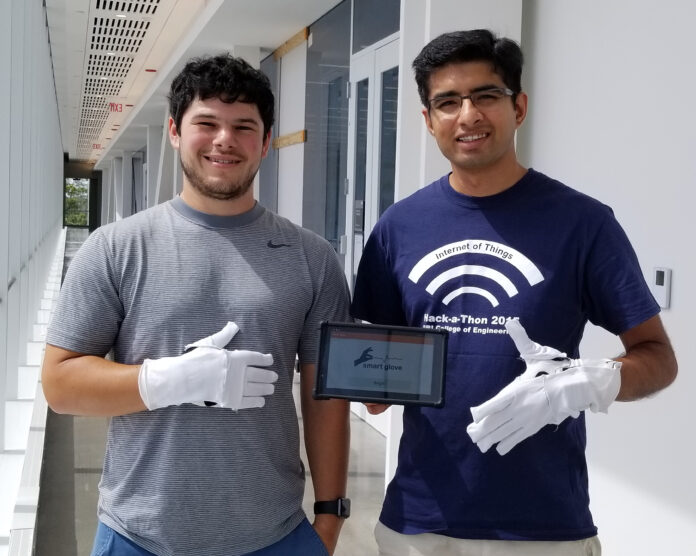
SOUTH KINGSTOWN – A University of Rhode Island professor has been awarded a $249,977 federal grant to help him continue to develop a “smart glove” that would assist people with Parkinson’s disease.
In addition to helping Parkinson’s patients, the glove has potential for commercial success, URI said.
The glove, which can collect data based on the movements of those living with Parkinson’s disease and other movement disorders, is being developed by URI Associate Professor of Engineering Kunal Mankodiya.
The data from the glove will help doctors make informed decisions on the type of exercises patients should perform and the medications to prescribe.
A two-year grant was awarded by the National Science Foundation through its Partnerships for Innovation Technology Translation program, which enables researchers to further develop a previous project funded by NSF that has commercial potential.
“This funding will enable us to take a deep dive into the world of fusing different domains, including conductive fabrics, wearable electronics, human-factors design and smart textile manufacturing,” Mankodiya said in a news release. “I’m glad that the NSF created such grant programs where innovative technologies could find their way to the marketplace over the years.”
Mankodiya and the students in his Wearable Biosensing Laboratory designed the first prototype of the smart glove in the summer of 2016.
“We’ve performed significant research on the smart gloves over the years,” Mankodiya said. “We decided that it’s time to transition this technology from research to the market. However, the transition is not straightforward. It will require very focused, narrow research to finalize the physical, digital and analytical components of the smart gloves.”
Nick Constant, who is pursuing a doctorate in electrical engineering at URI, has worked on the project from its inception and will explore its commercial opportunities.
“I spent time building the proof-of-concept glove in the lab for the original NSF CAREER grant,” said Constant. “Its ultimate outcome seemed clear from the beginning, but building a new technology takes time and testing. We have seen this glove go from a hopeful idea to gaining traction in reality through different design iterations and consultations with stakeholders.”
Just as the glove has evolved over time, so has Constant’s role.
“I suppose my involvement has changed from being just the graduate assistant to an entrepreneur,” Constant said. “Kunal and I wrote the new grant side by side and plan to pursue the research in the same manner. We will work with some partners who are familiar with the manufacturing process, supply chain and medical-device regulations.”
According to Constant, they are in the running for an R.I. Commerce Corp. Innovation Voucher, which would enable them to partner with someone on the design aspect of the glove.
“Our expected outcome is a glove that can be shown to investors that has a manufacture-friendly design, along with a practical price point,” said Constant, of West Warwick.
Another collaborator on the project will be neurologist Umer Akbar, who is the co-director of the Movement Disorders Program and the Deep Brain Stimulation Program at Rhode Island Hospital. He is also an assistant professor at Brown University’s Warren Alpert Medical School.
Using a sample size of 20 to 30 Parkinson’s disease patients, a pilot study will be conducted in Mankodiya’s lab at URI, at Rhode Island Hospital and with the gloves being worn in the patients’ homes.











